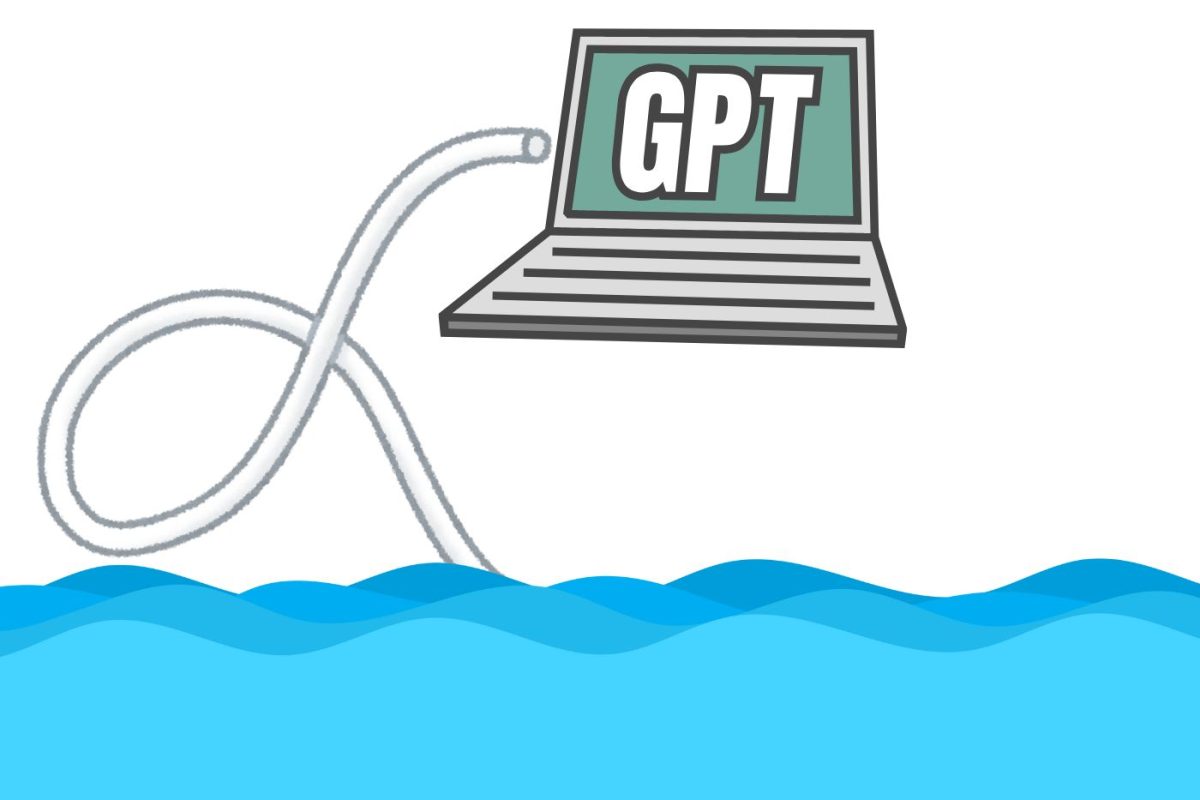In place of all the buzz surrounding innovations made possible by artificial intelligence (AI), there should be massive concern for the effect of its water consumption on the environment.
AI has managed to insert itself into our everyday lives in a myriad of ways: students find new and exciting ways to cheat on assignments, and adults use AI to perform the otherwise impossible task of refining their emails. However, both remain blissfully or perhaps willfully ignorant of its potential to grossly exacerbate the climate crisis.
According to the Associated Press, one conversation with ChatGPT is estimated to utilize approximately 16 ounces of water. This consumption occurs in two stages, illustrated in a graphic from the OECD.AI Policy Observatory.
We are on the verge of doing irreparable damage to our already struggling planet, and almost nobody seems to realize how close we are.
The image shows that water is first required to produce the power plant’s electricity to run the machines. Then, the AI servers must be cooled with water, to run the massive amount of data processing done by ChatGPT on a daily basis.
According to the United Nations, an estimated 700 million people will be forced to relocate due to drought and water insecurity by 2030. However, contingency plans are being traded for technological advancements as the rush to advance AI only becomes more frantic. We are on the verge of doing irreparable damage to our already struggling planet, and almost nobody seems to realize how close we are.
Tech giants like Apple, Google and Microsoft — all equally hungry for a slice of the limitless potential profit from AI — have astoundingly effective marketing strategies for erasing global awareness of AI’s massive water footprint. They use buzzwords and hype, all while stripping away our planet’s most vital resource.
To quantify that usage, according to AI consulting firm HyScaler, AI requires roughly nine liters of water for every kilowatt hour (kWh) of energy it consumes. Additionally, The New Yorker reports that ChatGPT alone uses over half a million kWh of electricity per day. Taken in sum, this brings the water consumption of AI to roughly the same amount of water as 1.6 million people every single day.
We cannot allow unchecked corporate ambition to overshadow the stark reality. While this may seem like a relatively tame figure considering the global population, that number is likely only a small fraction of the amount of water AI will consume if left unregulated. AI integration has already become a primary focus for major tech companies, with AI responses now at the top of every Google search, and Apple announcing last week that AI will now be integrated into all iPhones, iPads and Macs.
In an article by Forbes, tech CEO Cindy Gordon estimates that AI could be responsible for the withdrawal of 6.6 billion cubic meters of water in 2027, which is equivalent to 6.6 trillion liters.
Do people only care about greenhouse gas emissions when they are criticizing Taylor Swift?
Just recently, according to Bloomberg, Google stopped considering itself carbon neutral, a claim that has supposedly guided its company’s ethos since 2007. Also leading the charge into disaster, Microsoft’s water withdrawal rose by almost 2 billion liters in the past year.
When I first became aware of the staggering amount of water consumed by AI, several thoughts ran through my head, but chief among them was a morbid curiosity as to what trickle-down effect this setback for water conservation efforts might have.
The United States Environmental Protection Agency said that reducing water consumption can actually decrease greenhouse gas emissions, because it decreases use of water treatment plants, while also mitigating some of the pollution caused by human activity.
Do people only care about greenhouse gas emissions when they are criticizing Taylor Swift? Or are they being duped — made to believe that a tool that cannot even determine the number of times the letter “r” is contained in the word strawberry is somehow worth wreaking further havoc on our planet?
I may never be certain, but what is evident to me is that in the absence of a source of sustainable clean energy, ChatGPT will continue to double dip, drawing on massive amounts of energy to simply function, while also needing enormous, ecosystem-disturbing amounts of water to cool its processors. All of this in turn requires even more greenhouse gas emissions from water treatment plants.
In the case of ChatGPT, do not allow marketing that heralds AI as the future we have all been waiting for to distract from the fact that the marginal benefits it provides to the average user do not remotely excuse the immense burden it will place on the planet. Humanity will not have to wait to be displaced by “smarter machines.” Instead, it will simply cease to exist without adequate water supply.
If it’s a choice between AI-generated essays and access to clean water, I’ll write my own essays, thank you very much.



